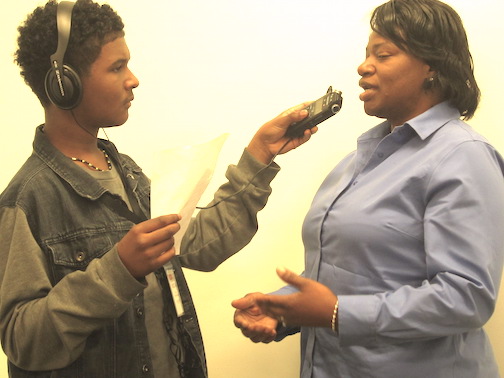Enjoy the audio version of this story here (click below):
As a teen, I can tell you that parents and dating don’t go hand-in-hand but — what if you were in an abusive relationship? Can it happen to you? What would your parents say? Would they actually help or make it even worse?
“I experienced a situation as a teen where I was beat and thrown down a flight of stairs at the age of 17, so I know that teen dating violence can happen,” said Natasha Brown, a mother of two teens who experienced a traumatic incident during her own teen years maneuvering through the labyrinth of love. “You never know how you’re going to react until you’re in a situation like that.”
Paul Cunningham, another father of two teens, points out, “When you’re starting to date someone for the first time, everybody puts on their ‘best behavior’.”
We never want to be with someone who causes us harm, but as Cunningham said, “You don’t know if someone has abusive tendencies until you get to know them better.”
One of the reasons parents and teens don’t like to talk about dating or anything dealing with sex is because it creates an awkward vibe between parent and teen. This is sometimes due to the age and experience difference between teen and parent, and also the parent viewing the teen as a child and not a young adult.
When it comes to dating, “I think a lot of parents have sort of a negative outlook on it. I think a lot of them think their children are too young, regardless of what age it may be,” said Annabess Ehrhardt, a college sophomore and the training manager at Emory Sexual Assault Peer Advocates (SAPA).
Because of this parental perspective, a lot of teens might feel more comfortable going to a peer about dating issues, rather than a parent. “Parents do get scared and worried in a way that peers a lot of times don’t,” said Ehrhardt. “When they talk to their peers, they may get someone who’s more understanding or just won’t make as big as a deal out of it.”
Still, most of the parents I interviewed said they think their teens would tell them if they were in an abusive relationship. “If my daughter was dating now, I think she would be comfortable telling me if she experienced some type of violence,” said Mr. Brown.
National data indicates teens might not want to bring it up with a parent.
According to LoveisRespect, a national nonprofit resource aimed at empowering youth to prevent and end dating abuse, 81 percent of parents believe teen dating violence is not an issue, or admit they don’t know it’s an issue, even though almost “1.5 million high school students nationwide experience physical abuse from a dating partner in a single year.”
“If she’s not comfortable telling me then it’s probably due to embarrassment,” said Cunningham.
“‘How did I get myself into this?’” Marva Cunningham said, imagining what her daughter might think. “‘I know better.’”
“If someone did approach her in a harmful manner, I think she would be comfortable coming to me or her father,” said Brown, but she can’t imagine the situation coming up. “I don’t think she would be in an abusive relationship.”
Each of the seven parents I talked to feel like their teens would have an open communication with them. They also had advice for other parents and teens, and ideas about helpful resources.
“Parents need to know that there are summits available [like the PADV Teen Summit] where they and their kids can come in and get information,” said Sharon, a parent who took part in the annual PADV summit, mother of Shakire who attends South Gwinnett High.
“When are we going to address the importance of teen violence? The media should be aware and more accepting to discuss teen violence. The schools need to realize that it needs to be a part of the curriculum,” Sharon said. “Kids need to be taught that it is there, recognize the signs and how to deal with it. We need to have teachers ready to have sessions with kids with organizations come in and discuss teen violence without having a stigma of them being limited to what they can or cannot say.”
“My advice for parents with teenagers is you cannot shelter your children. They will sneak and hide, so the best thing you can do is to keep an open rapport with them, because they are going to do it anyways,” Brown said.
Ehrhardt, the Emory peer educator, agrees: “Rather than playing the role of someone who says, you’re not ready for this, don’t do it, [parents] should be there to support their children and talk to them, and really educate them and tell them.”
A lot of parents believe that if their teens were in an abusive relationship they would be comfortable telling them, but is that really the case? Would you be open about being in an abusive relationship or would you feel embarrassed?
Jason Crichton, 14, is a freshman at Therrell High who wants to go into journalism when he grows up.




